news
PDP to military: don’t obey order on ballot box snatching
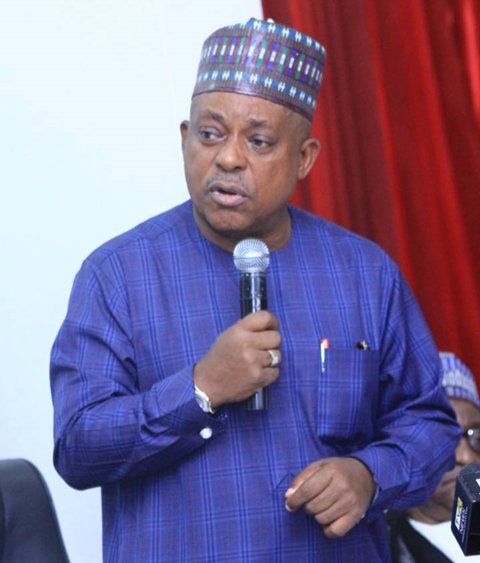

The presidential candidate of the People’s Democratic Party (PDP) Atiku Abubakar and PDP national chairman, Prince Uche Secondus, have urged the military and other security agencies not to obey the presidential order asking them to deal ruthlessly with would-be ballot box snatchers.
The party chieftains described the order as unlawful, insisting that there are enough provisions in the nation’s laws for the arrest and prosecution of ballot box snatching and other electoral offences.
Speaking at a national caucus meeting of the All Progressives Congress (APC) in Abuja on Monday, President Buhari had said: “Anybody who decides to snatch boxes or lead thugs to disturb the election, may be that would be the last unlawful action you would take.
“I have given the military and police the order to be ruthless. I am going to warn anybody who thinks he would lead a body of thugs in his locality to snatch boxes or to disturb the voting system; he would do it at the expense of his/her own life”.
But speaking Wednesday in Abuja, at the 84th National Executive Committee (NEC) meeting of the PDP, the two opposition chieftains cautioned President Buhari not to let loose anarchy in the country during the upcoming elections.
Atiku said it’s shocking for any head of state to utter such words in a democracy and that Nigerians should not accept it from President Buhari, adding “We have fought more ruthless dictators than himself”.
According to him, Buhari’s actions and utterances since he mounted the saddle in 2015 have been painful reminders of the era of military dictatorship.
“General Buhari has consistently violated the constitution; he failed to uphold the rule of law. Recent instances include the unconstitutional suspension of the Chief Justice of Nigeria a day before he was supposed to inaugurate the committee for the election tribunals that will decided any appeals or whether our elections were subject to manipulation, thereby crossing the immutable line that divides the executive from the judiciary.
“When you people are talking about democracy, I have always said that Gen. Muhammadu Buhari is not a democrat, he has never been a democrat. We started the fight to drive the military, he was never there, he never participated.
“You can see that he just wore the garb of democracy so that he can come back to power and do whatever he is doing. So Gen Buhari is not a democrat, he doesn’t believe in democracy, he is a lip service, he is more of a power monger than a democrat.
“A precondition for free, fair and credible election is that the people are able to freely vote the candidate of their choice. You owe it to the people to let them give their verdict in the same way that you were elected. If you do so and if you win, then the people will commend you for it. Otherwise, history will condemn you for it. But before history does that, we will condemn you for it,” Atiku added.
Secondus said Nigerians were still in shock as a result of the order, stressing that the same President who has been “off duty” since the needless bloodletting in various parts of the country over the years, could give what amounted to shoot-on-sight orders against ballot snatching.
Secondus said, “By that directive, ordering soldiers to kill our citizens without recourse to the law and with impunity, the President has unwittingly given license to APC leaders to carry military personnel on Saturday.
“The agenda of that directive is clear; to scare away voters and agents, that we have directed to defend their votes, so as to give way to a military protected political thugs to come into the polling booths, and implement their result replacement strategy.
“The President’s body language alongside that of his party hierarchy appeared remorseless for the damage done to our democracy or the huge private and public resources wasted by the inability of APC hawks acting as contractors and consultants to allow INEC to operate.
“I can indeed make the conclusion, that from inception, President Buhari, was not ready for free and fair elections, otherwise he would easily have signed the amended Electoral Act, which would have enabled peaceful and hitch free elections in 2019.
“President Buhari’s disregard for institutions of states, which started with the attempt of the Executive to hijack the Legislature, has continued unabated, with the illegal suspension of the Chief Justice of Nigeria (CJN) Justice Walter Onnoghen, and the swearing in of an acting CJN”.
The party chair insisted on non-deployment of military or paramilitary units to electoral duties, as, according to him, elections are civil activities, which the police are best trained to handle.
He also sought assurances from the Federal Government that all communication assets – fixed and mobile, including the Internet, will not be interrupted or compromised during the elections.
The party chair similarly urged adherence to steps taken by the government to safeguard the conduct of the elections, including restriction of movements and closure of the nation’s borders with the Republics of Chad and Niger.
The meeting, which lasted several hours, was attended by key party stakeholders, including governors, federal lawmakers, former cabinet Ministers and members of the Board of Trustees.
news
BREAKING: Tinubu Names Tunji Disu Acting Inspector General After Egbetokun’s Exit

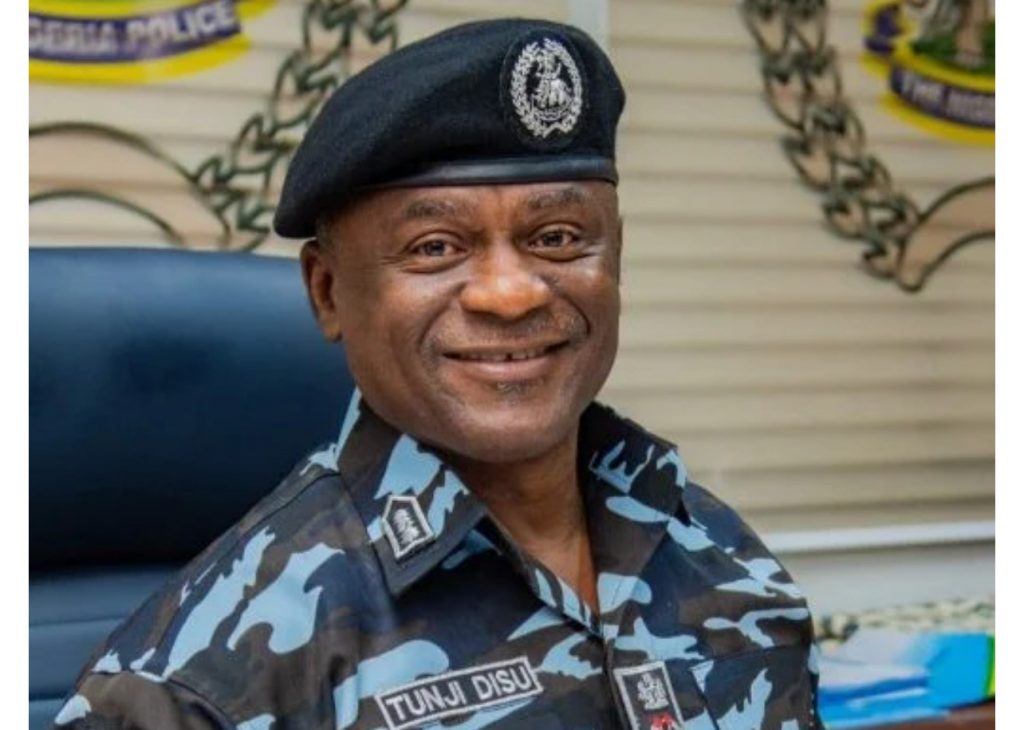
President Bola Tinubu has accepted the resignation of the Inspector-General of Police, Kayode Egbetokun, and approved the appointment of Tunji Disu as Acting Inspector-General of Police with immediate effect.
Our correspondent had earlier reported that Egbetokun tendered his resignation letter on Tuesday, citing pressing family considerations.
Appointed in June 2023, Egbetokun was serving a four-year term scheduled to conclude in June 2027, in line with the amended provisions of the Police Act.
In a statement issued on Tuesday by his Special Adviser on Information and Strategy, Bayo Onanuga, the President received the letter earlier on Tuesday and expressed appreciation for his service to the nation.
He also commended Egbetokun’s “decades of distinguished service to the Nigeria Police Force and the nation,” acknowledging his “dedication, professionalism, and steadfast commitment to strengthening internal security architecture during his tenure.”
“In view of the current security challenges confronting the nation, and acting in accordance with extant laws and legal guidance, President Tinubu has approved the appointment of Assistant Inspector-General of Police Tunji Disu to serve as Acting Inspector-General of Police with immediate effect.
“The President is confident that AIG Disu’s experience, operational depth, and demonstrated leadership capacity will provide steady and focused direction for the Nigeria Police Force during this critical period,” the statement read.
It added that in compliance with the provisions of the Police Act 2020, the President will soon convene a meeting of the Nigeria Police Council to formally consider Disu’s appointment as substantive Inspector-General of Police, after which his name will be forwarded to the Senate for confirmation.
The President reaffirmed his administration’s commitment to enhancing national security, strengthening institutional capacity, and ensuring that the Nigeria Police Force remains professional, accountable, and fully equipped to discharge its constitutional responsibilities.
news
Breaking : Nigeria Gets New Electoral Act as Tinubu Signs 2026 Reform Bill

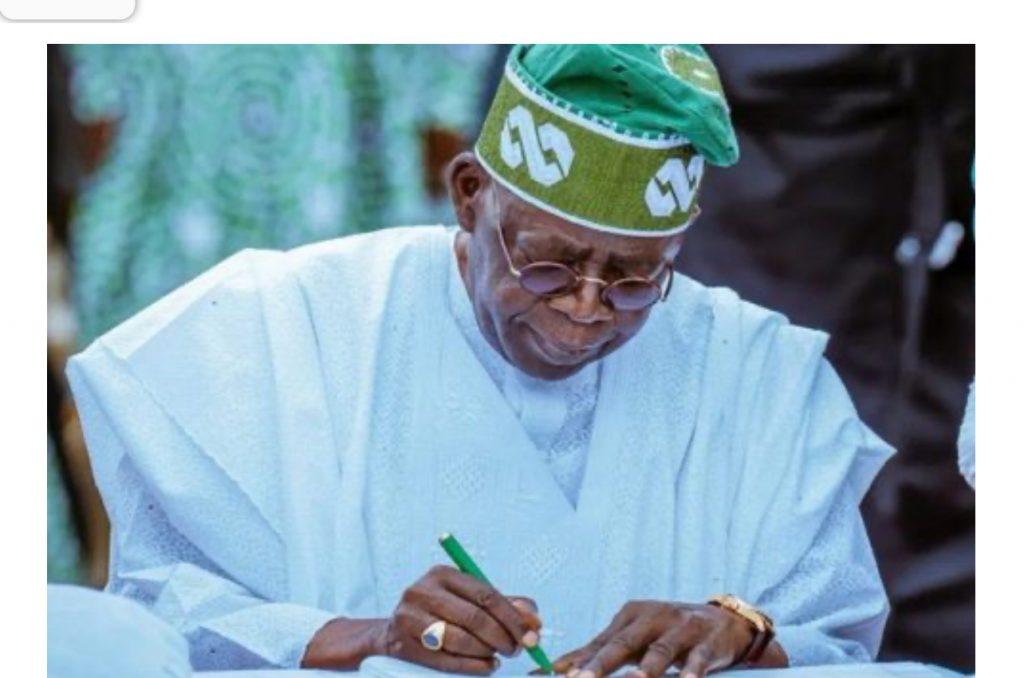
President Bola Tinubu has signed the Electoral Act 2026 (Amendment) into law, days after the Independent National Electoral Commission (INEC) released the timetable for the 2027 general elections.
The signing ceremony took place at the State House, Abuja, at about 5:00pm on Wednesday, with principal officers of the National Assembly in attendance.
The National Assembly had on Tuesday passed the Electoral Act 2026 (Amendment) Bill.
The latest amendment comes amid intense public debate over the electronic transmission of election results in real time.
Last week, protests erupted at the National Assembly complex as civil society organisations and opposition figures mounted pressure on lawmakers to mandate live transmission of results from polling units directly to INEC’s central server.
The protesters argued that real-time transmission would reduce result manipulation and strengthen public confidence in the electoral process.
However, the ruling All Progressives Congress (APC) and some stakeholders have raised concerns about the technical feasibility of live transmission, particularly in communities with weak telecommunications infrastructure. They have argued for a phased or hybrid approach that would allow manual collation where electronic systems fail.
news
EFCC Extends El-Rufai’s Stay in Custody Amid ₦432bn Probe
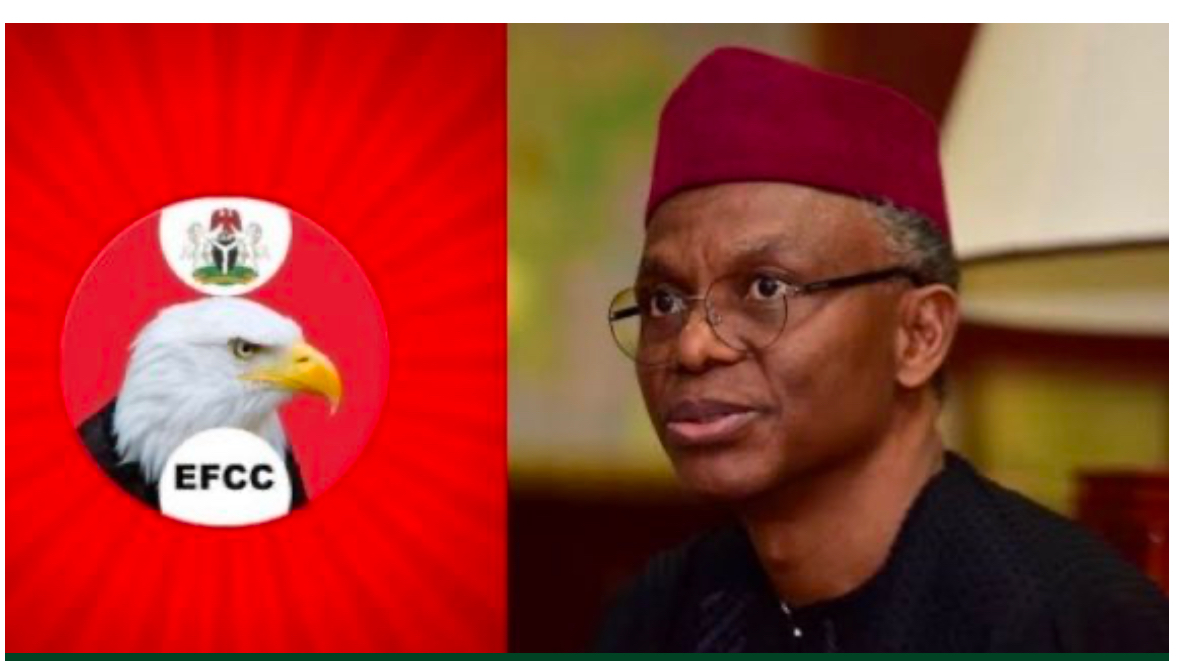
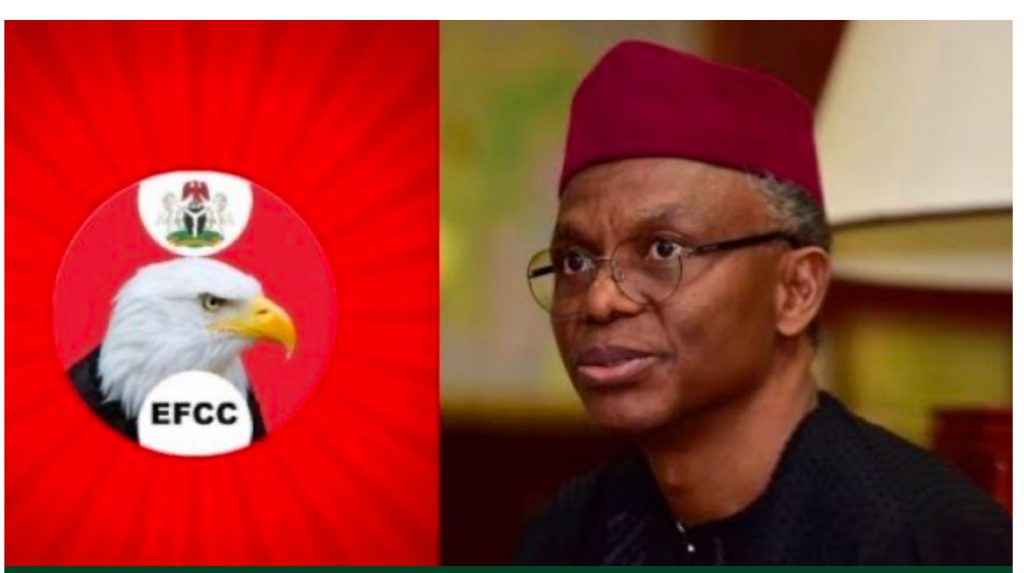
Former Kaduna State Governor, Nasir El-Rufai, on Tuesday spent the second night in the custody of the Economic and Financial Crimes Commission, as his lawyer, A.U Mustapha (SAN), pushes for his release on bail.
There are, however, indications that the commission may seek a remand order to extend his stay in custody to enable him to respond to questions posed by investigators handling his matter.
The former governor arrived at the EFCC headquarters in Abuja on Monday around 10 a.m. for questioning in connection with an alleged N432bn corruption probe. He was, however, detained at the commission, where investigators continued to grill him.
An official of the commission who pleaded anonymity said the anti-graft agency was considering obtaining a remand order after the expiration of the hours allowed by law to enable investigators conclude questioning him.
“Forget the speculations being peddled on social media that he has been released. He has not. El-Rufai is still with us and will be spending another night in custody.
“He is very much with us and will remain so because the investigators are considering getting a remand order after the expiration of the 48 hours allowed by law.
“The investigators need some time with him to answer questions arising from his eight years as governor in Kaduna State,” the source said.
Speaking in a telephone conversation with The PUNCH on Tuesday, El-Rufai’s counsel, Mustapha, confirmed that the former governor remained with the anti-graft agency, while insisting that his client had fully cooperated with investigators.
He described his client as a responsible citizen who is not a flight risk if granted bail.
Mustapha said, “Well, as a responsible citizen, he was invited and, true to his word, he honoured the invitation.
“As we speak, he is still with the EFCC. He is cooperating to the best of his capacity, and we hope that the EFCC, given its integrity, will be kind enough to admit him to bail because he is presumed innocent, and I am sure if he is granted bail, he will not jump bail.
“He is a responsible citizen, and everybody knows him. He came to Nigeria on his own volition. He wrote a letter that he was going to honour the EFCC invitation, and he kept his word as a man of integrity. We’re hopeful that very soon he will be granted bail.”
When asked about the specific allegations against his client, Mustapha declined to offer details.
“You’re asking the right question from the wrong person. That question can only be answered by the EFCC and not by me. I would just be speculating, and lawyers don’t do that.”
Pressed further on whether he witnessed parts of the interrogation and what it was about, Mustapha responded, “That would be prejudicial. It’s a confidential matter and not meant for public consumption.”
The EFCC’s interrogation is linked to the report of an ad hoc committee of the Kaduna State House of Assembly set up in 2024 to probe finances, loans, and contracts awarded between 2015 and 2023 during El-Rufai’s administration.
EFCC extends El-Rufai detention, Plateau indigenes killed, other top stories
Rep backs real-time electronic transmission of election results
The committee, chaired by Henry Zacharia, had alleged that several loans obtained during the period were not utilised for their intended purposes.
While presenting the report, the Speaker, Yusuf Dahiru Leman, claimed that about N423bn was allegedly siphoned under the former governor’s administration.
The committee recommended the investigation and prosecution of El-Rufai and some former cabinet members over alleged abuse of office, diversion of public funds, money laundering, contract awards without due process, and reckless borrowing.
The Assembly subsequently forwarded petitions to the EFCC and the Independent Corrupt Practices and Other Related Offences Commission.
El-Rufai has denied the allegations, describing the probe as politically motivated, and insisted that loans obtained during his tenure were properly appropriated and used for infrastructure, education, healthcare, and security.
On Monday, an EFCC source said the commission had been investigating the matter for about a year, noting that suspects are usually invited after investigations have reached an advanced stage.
“The commission has been investigating him for about a year now. As a commission, we don’t just rush to invite suspects. Persons accused are always the last; that is, after we might have done our investigation to an advanced stage.
“We are investigating him on the allegations against him by the Kaduna State Assembly,” the source said.
Meanwhile, in a separate development, the Department of State Services has filed criminal charges against El-Rufai before the Federal High Court in Abuja over alleged unlawful interception of the phone communications of the National Security Adviser, Nuhu Ribadu.
The three-count charge, marked FHC/ABJ/CR/99/2026, was filed under the Cybercrimes (Prohibition, Prevention, etc.) Amendment Act, 2024, and the Nigerian Communications Act, 2003.
According to the charge sheet, El-Rufai allegedly admitted during a February 13, 2026, appearance on Arise TV’s Prime Time Programme that he and unnamed associates unlawfully intercepted Ribadu’s communications.
Count One alleged that El-Rufai “did admit during the interview that you and your cohorts unlawfully intercepted the phone communications of the National Security Adviser, Nuhu Ribadu,” an offence said to be punishable under Section 12(1) of the Cybercrimes Amendment Act.
Count Two accused him of acknowledging knowledge of an individual involved in the alleged interception without reporting it to security agencies, while Count Three alleged that he and others still at large used technical equipment that compromised public safety and national security.
The prosecution further claimed that the alleged act, reportedly admitted during the television interview, caused “reasonable apprehension of insecurity among Nigerians.”
He is yet to be arraigned.
-

 news5 years ago
news5 years agoUPDATE: #ENDSARS: CCTV footage of Lekki shootings intact – Says Sanwo – Olu
-

 lifestyle6 years ago
lifestyle6 years agoFormer Miss World: Mixed reactions trail Agbani Darego’s looks
-

 health5 years ago
health5 years agoChairman Agege LG, Ganiyu Egunjobi Receives Covid-19 Vaccines
-

 lifestyle4 years ago
lifestyle4 years agoObateru: Celebrating a Quintessential PR Man at 60
-

 health6 years ago
health6 years agoUPDATE : Nigeria Records 790 new cases of COVID-19
-

 health6 years ago
health6 years agoBREAKING: Nigeria confirms 663 new cases of COVID-19
-

 entertainment1 year ago
entertainment1 year agoAshny Set for Valentine Special and new Album ‘ Femme Fatale’
-

 news9 months ago
news9 months agoBREAKING: Tinubu swears in new NNPCL Board


